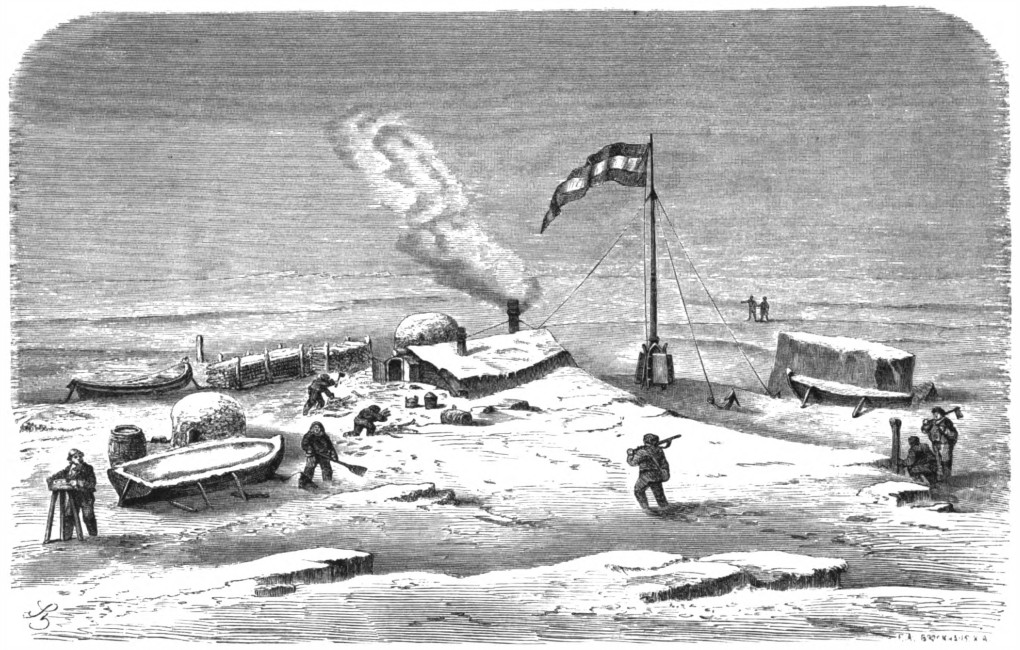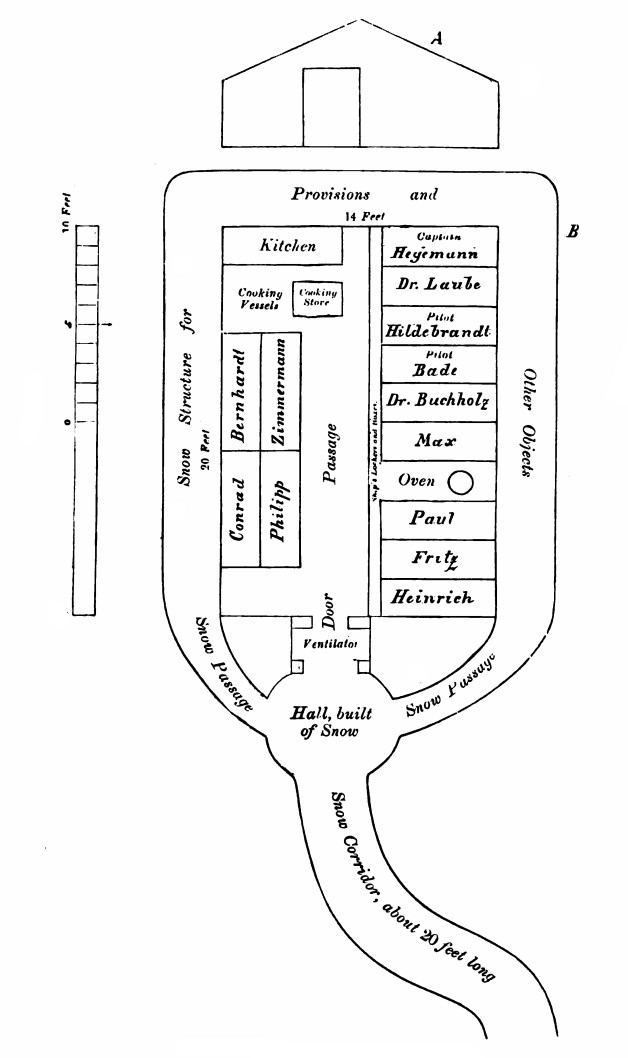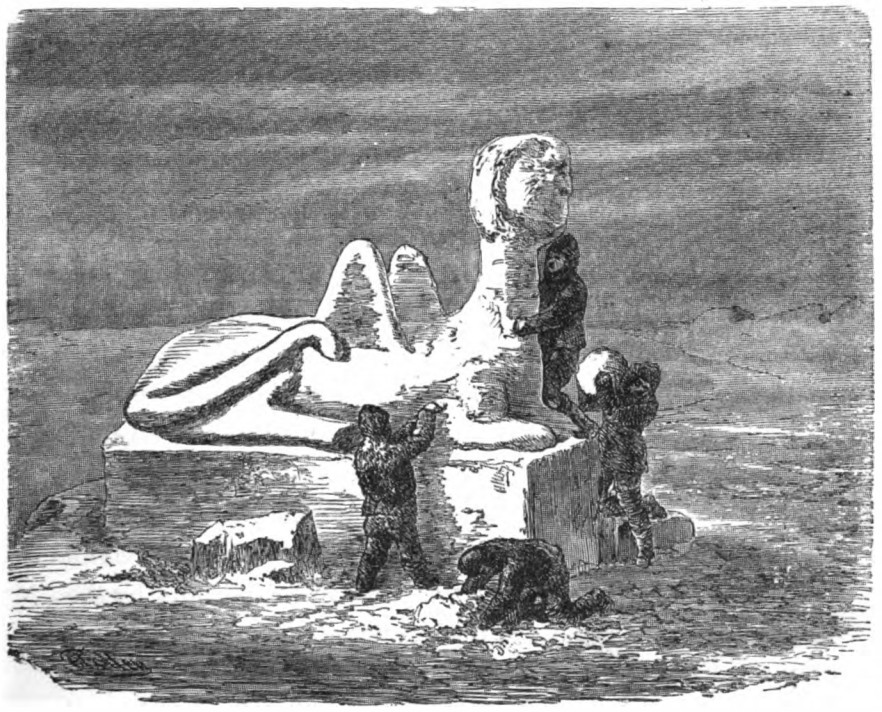211-Cast Away on an Ice Floe
Futility Closet
Greg Ross
4.8 • 748 Ratings
🗓️ 6 August 2018
⏱️ 33 minutes
🧾️ Download transcript
Summary

Germany's polar expedition of 1869 took a dramatic turn when 14 men were shipwrecked on an ice floe off the eastern coast of Greenland. As the frozen island carried them slowly toward settlements in the south, it began to break apart beneath them. In this week's episode of the Futility Closet podcast we'll follow the crew of the Hansa on their desperate journey toward civilization.
We'll also honor a slime mold and puzzle over a reversing sunset.
Intro:
The yellow-bellied longclaw, Macronyx flavigaster, could produce the long-sought 10×10 word square.
Bruckner's seventh symphony has made generations of cymbalists nervous.

A ground plan of the "Hansa house," from expedition commander Karl Koldewey's 1874 narrative.
Sources for our feature on the Hansa:
Fergus Fleming, Ninety Degrees North: The Quest for the North Pole, 2007.
William James Mills, Exploring Polar Frontiers: A Historical Encyclopedia, 2003.
David Thomas Murphy, German Exploration of the Polar World: A History, 1870-1940, 2002.
Karl Koldewey, The German Arctic Expedition of 1869-70: And Narrative of the Wreck of the "Hansa" in the Ice, 1874.
"The 'Polaris' Arctic Expedition," Nature 8:194 (July 17, 1873), 217-220.
"The Second German Arctic Expedition," Nature 11:265 (Nov. 26, 1874), 63-66.
"The Latest Arctic Explorations -- The Remarkable Escape of the Polaris Party," Scientific American 28:23 (June 7, 1873), 352-353.
Leopold M'Clintock, "Resumé of the Recent German Expedition, from the Reports of Captain Koldewey and Dr. Laube," Proceedings of the Royal Geographical Society of London 15:2 (1870-1871), 102-114.
William Barr, "Background to Captain Hegemann's Account of the Voyage of Hansa and of the Ice-Drift," Polar Geography and Geology 17:4 (1993), 259-263.
"The Polaris," Report to the Secretary of the Navy, Executive Documents, First Session, 43rd Congress, 1873-1874, 12-627.
Fridtjof Nansen, "Towards the North Pole," Longman's Magazine 17:97 (November 1890), 37-48.
T. Nelson, Recent Expeditions to Eastern Polar Seas, 1882.
N.S. Dodge, "The German Arctic Expedition," Appleton's Journal of Popular Literature, Science, and Art 5:93 (Jan. 14, 1871), 46-47.
"The Thrones of the Ice-King; or, Recent Journeys Towards the Poles," Boy's Own Paper 5:237 (July 28, 1883), 700-702.
William Henry Davenport Adams, The Arctic: A History of Its Discovery, Its Plants, Animals and Natural Phenomena, 1876.
"A Contrast," New York Times, July 21, 1875.
"Letters to the Editor," New York Times, July 12, 1875.

A sphinx of snow.
Listener mail:
"I am the Airport K-9 Guy. My dog is the 'Airport Guard Dog' that made the front page last week. AMA!," Reddit Ask Me Anything, Feb. 29, 2016.
Kris Van Cleave, "Meet Piper, a Dog Helping Protect Planes From Bird Strikes," CBS News, June 9, 2016.
"Visiting Non-Human Scholar: Physarum Polycephalum," Hampshire College (accessed July 26, 2018).
Robby Berman, "Slime Molds Join the Faculty at Hampshire College," Big Think (accessed July 26, 2018).
Robby Berman, "Scientists Catch Slimes Learning, Even Though They Have 0 Neurons," Big Think (accessed July 26, 2018).
Karen Brown, "Should We Model Human Behavior on a Brainless, Single-Cell Amoeba?", NEPR, Nov. 7, 2017.
Ashley P. Taylor, "Slime Mold in Residence," The Scientist, March 2, 2018.
Joseph Stromberg, "If the Interstate System Were Designed by a Slime Mold," Smithsonian.com, May 15, 2012.
"Heather Barnett: What Humans Can Learn From Semi-Intelligent Slime," TED, July 17, 2014.
Tejal Rao, "With a Sniff and a Signal, These Dogs Hunt Down Threats to Bees," New York Times, July 3, 2018.
This week's lateral thinking puzzle was contributed by listener Dan Lardner.
You can listen using the player above, download this episode directly, or subscribe on Google Podcasts, on Apple Podcasts, or via the RSS feed at https://futilitycloset.libsyn.com/rss.
Please consider becoming a patron of Futility Closet -- you can choose the amount you want to pledge, and we've set up some rewards to help thank you for your support. You can also make a one-time donation on the Support Us page of the Futility Closet website.
Many thanks to Doug Ross for the music in this episode.
If you have any questions or comments you can reach us at [email protected]. Thanks for listening!
Transcript
Click on a timestamp to play from that location
| 0:00.0 | Welcome to the Futility Closet Podcast, forgotten stories from the pages of history. |
| 0:14.2 | Visit us online to sample more than 10,000 quirky curiosities from a bird's word square to an apprehensive percussionist. This is episode |
| 0:22.5 | 211. I'm Greg Ross. And I'm Sharon Ross. Germany's polar expedition of 1869 took a dramatic |
| 0:30.0 | turn when 14 men were shipwrecked on an ice flow off the eastern coast of Greenland. As the |
| 0:36.1 | frozen island carried them slowly |
| 0:37.9 | towards settlements in the south, |
| 0:39.8 | it began to break apart beneath them. |
| 0:42.4 | In today's show, we'll follow the crew of the Hansa |
| 0:45.0 | on their desperate journey towards civilization. |
| 0:48.5 | We'll also honor a slime mold |
| 0:50.7 | and puzzle over a reversing sunset. |
| 1:03.0 | By the 1860s, the British and the Americans were both making active efforts to explore the Arctic and to reach the North Pole. In 1866, the German geographer August |
| 1:08.1 | Peterman urged his own nation to join in the contest to help establish |
| 1:11.5 | itself as a great power. So, after an early effort in 1868, Germany launched its first serious |
| 1:17.5 | Arctic expedition on June 15, 1869, when two ships left Bremerhaven and headed up the east |
| 1:23.5 | coast of Greenland. The Germania was a two-masted steamer built especially for Arctic exploration. |
| 1:29.4 | The Hansa, her supply ship, was half her size and had to be strengthened for the voyage. |
| 1:34.1 | The two sailed north for five days, hidden from each other by a fog so thick they had to communicate |
| 1:38.4 | by speaking trumpet. On the fifth evening, they approached the great ice fields of the far north. |
| 1:43.8 | Their goal was to push |
| 1:44.7 | as far as possible toward the pole, but in 1869 no one knew what to expect. Everything above the |
| 1:49.7 | 83rd parallel was still a blank. Some people thought the ice extended all the way to the pole, |
... |
Please login to see the full transcript.
Disclaimer: The podcast and artwork embedded on this page are from Greg Ross, and are the property of its owner and not affiliated with or endorsed by Tapesearch.
Generated transcripts are the property of Greg Ross and are distributed freely under the Fair Use doctrine. Transcripts generated by Tapesearch are not guaranteed to be accurate.
Copyright © Tapesearch 2025.

